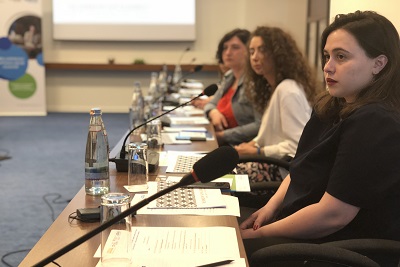Dialogue to be launched on policy aiming to eliminate gender pay gap
Date:
The gender pay gap and its elimination is one of the most serious challenges faced by Georgia. To understand this topic and implement relevant policy, it is necessary to have accurate data and to analyse it.

The gender pay gap analysis that was presented by UN Women on 22 May 2019 rests on the labor force survey carried out by the National Statistics Office of Georgia. It must be noted that the data on monthly and hourly pay was broken down by gender for the first time ever and covered employment-related factors such as age, education, qualifications and employment sector, among others.
The results of the study show that according to the 2017 data, the monthly gender pay gap comprised 35.2 per cent, which means that women in Georgia earned GEL 0.65 against GEL 1 earned by men on a monthly basis. Calculating the difference between the hourly earnings of women and men is also important because women, due to unpaid household work, have less time for paid work. The difference in hourly gender earning, taking into account personal characteristics (age, education) and other factors (position held, sector of employment, etc.) comprised 24.8 per cent in 2017. The study also showed that unemployed women have better characteristics than their male counterparts; for example, 38 per cent have a higher education, compared to 16 per cent of unemployed men.
On the initiative of UN Women, this data was discussed at the Gender Equality Council of the Parliament of Georgia on 22 May. Representatives of the legislative and executive branches and civil society discussed the policy on the elimination of gender inequality.
“We have already developed a long-term strategy and the two-year action plan that the Parliament will follow to intensify its engagement in the fulfilment of the Sustainable Development Goals, which, of course, concern gender equality, including the elimination of the pay gap,” remarked Irine Pruidze, member of the Gender Equality Council.
According to the Deputy Minister of Economy and Sustainable Development of Georgia, Ekaterine Mikabadze, the Government plans to join the Equal Pay International Coalition (EPIC); this will have a positive impact on the policy aiming to eliminate the gender pay gap.
The meeting was held within the framework of “Women’s Economic Empowerment in the South Caucasus”, a regional project implemented by UN Women with financial support from the SDC and the ADA.